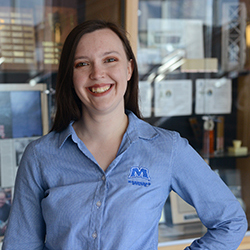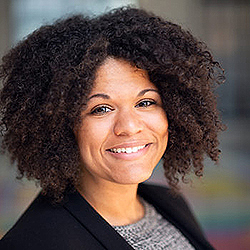College of Science
Student Success
Alumni Ammons and Payne collaborate at MIT


The two are working on a research project involving MIT, its Haystack Observatory and MSU. The project uses CubeSats to deploy antennas to observe the interactions between the sun’s magnetic fields and the northern and southern auroras in Earth’s atmosphere. Ammons is pursuing a master’s degree and Payne is a Ph.D. candidate. In addition to the collaborative project, Payne is also working on a project to use CubeSats to monitor the effects of climate change on Earth’s oceans.
Payne earned her bachelor’s in Space Science at MSU, and Ammons earned her bachelor’s in Space Systems Engineering. Both Payne and Ammons said they were introduced to the field through their interactions with MSU while still in high school. Payne attended the Governor’s Scholars Program (GSP) at MSU in the summer of 2011 and said the experience was a turning point for her.
“As a kid, I used to look up at the stars and wonder what was going on up there, but I didn’t think I could go much farther than wondering,” she said. “Then, GSP showed me I can study it. I studied astronomy at GSP that summer and fell in love with it.”
For Ammons, her connection to MSU began with Jen Carter, director of the Center for STEM+eXcellence at the Craft Academy for Excellence in Science and Mathematics and a former science teacher at Rowan County Senior High School. Carter recommended that Ammons attend Space Trek, a residential summer camp for girls interested in STEM at MSU’s Space Science Center.
“That kind of introduced me to the idea that hey, I like this engineering, science field,” Ammons said.
Both Ammons and Payne attribute a big part of their success to their time at MSU, saying the hands-on experiences they had here gave them an edge once they got to MIT.
“I think it’s really creative how they allow you to learn things,” Payne said. “I learned programming and electronics in a really hands-on way because the program prioritized project-based learning.
I loved the small classes because it was an intimate learning setting, so you could be open and ask questions that you would maybe feel uncomfortable asking in a larger class.”
Ammons felt the same, saying MSU’s small, intimate classroom and lab settings allow the space systems engineering program to provide opportunities bigger schools can’t match.
“What I think Morehead has over the larger institutes that boast the big-name research is that it was a small, familial type of environment,” she said. “Had I gone to UK, I probably wouldn’t have had the chance to do the kinds of hands-on research that I got to do at MSU.”
Both Ammons and Payne said the faculty at MSU played a significant role in their success as well. Payne said she didn’t realize that her first space science professor, Professor Emeritus Bob Twiggs, was a “rock star” in the aerospace industry until she attended a conference and saw how people approached him. Ammons said many professors, both inside and outside of the space systems engineering program, helped her by being supportive, positive and encouraging as she pursued her degree.
“Just knowing there were people that stood behind me and were enthusiastic about my success outside of what I could bring to the table for them, you can’t over-sell the importance of having people who believe in you,” Ammons said.
“I was able to sit in on meetings with folks from NASA and other big aerospace companies in the Space Science Center,” Payne said. “Even if I wasn’t on a project, I was able to come and sit and just listen and get familiar with how these conversations go, and that was invaluable. If I hadn’t had that before coming to MIT, there would have been this huge learning curve, and I don’t think I would have gotten that anywhere else.”
To learn more about space systems engineering programs at MSU, visit www.moreheadstate.edu/phes, email phes@moreheadstate.edu or call 606-783-2381.
College can change lives and communities. Higher educational attainment increases tax revenue, decreases unemployment and even improves health outcomes. Learn more from the KY Council on Postsecondary Education at kyhigheredmatters.org.
